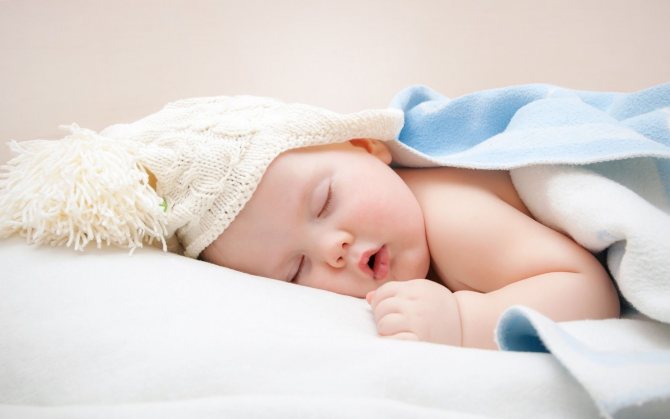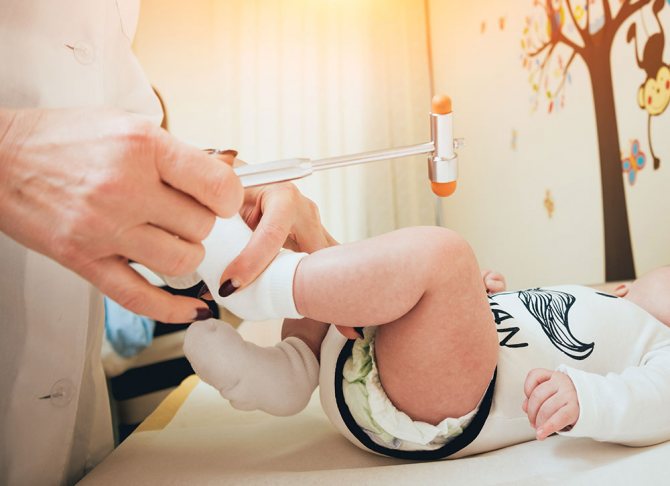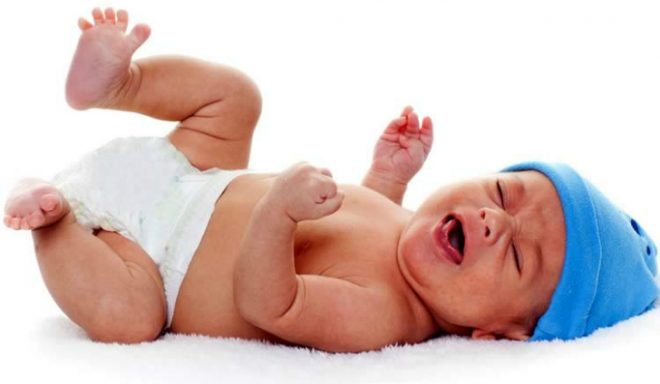Young mothers and fathers often do not know why a child may twitch in his sleep. There are physiological reasons that should not cause alarm. They will not affect the baby's health. It happens that infants begin to twitch their arms and legs in the presence of neurological disorders. To exclude the development of pathologies, you need to carefully monitor the baby, create comfortable conditions for sleep and, if alarming symptoms are detected, consult a doctor.
Baby
Peculiarities of sleep in children under one year old
Children under one year old sleep is mostly superficial. It constantly moves from the fast phase to the deep phase. At the same time, the baby can open his eyes slightly. If he feels discomfort, for example, he is cold, hot or wet, he will finally wake up and report his dissatisfaction to adults.
A baby needs REM sleep to learn new information and relieve nervous tension accumulated during the day. If your baby sleeps healthy and is steadily gaining weight, then there is no need to worry about his condition.
Newborn babies sleep about 20 hours a day. They need this to grow and develop. They wake up to eat and change clothes. Gradually, as the year progresses, the duration and number of daytime sleeps decrease. At 11-12 months, infants rest mainly at night.
Recommendations for preventing sleep disorders in children
Taking care of your baby's health should begin with planning your pregnancy. Doctors recommend that future parents undergo examinations; the mother must be observed at the antenatal clinic for the entire period of pregnancy. This will prevent various pathologies and help the baby develop properly. Even before the newborn is brought home, it is necessary to think about his resting place; he will spend about 20 hours a day there. Please pay attention to the following requirements:
- the cradle should be comfortable and safe;
- Let the bed linen be made from natural fabrics;
- you need to choose the correct location of the cradle;
- it must be possible to ensure normal light conditions;
- constant access to fresh air is required.
These aspects will help to properly organize the baby’s sleep from the first days. In the future, the baby will get used to the regime, and it will be easier to put him to rest. This will help the whole family create their own schedule, make time for their own affairs and communication. When rocking a baby, you should not shake it too much; it is better to accustom him to falling asleep in his own crib.
The microclimate in the family plays an important role in explaining why a child shudders when he sleeps. Children are very sensitive to the psychological atmosphere between loved ones. If parents have conflicts, scandals, or tense relationships, this worries him and affects the quality of his sleep.
Why does a child twitch when falling asleep?
The fact that a child twitches in his sleep often frightens young parents. Doctors usually confirm that this is no cause for concern.
Why does a baby cry when he wakes up?
Infants often shudder when falling asleep. This usually confirms that the baby had an emotional day. For him, everything in the world is new; the baby does not always have time to absorb information and consolidate skills. Therefore, the task of parents is not to overload the baby’s nervous system, especially in the evening. This applies not only to unpleasant events and impressions, but also to joyful ones.
Note! A child's sleep may be affected by worries that his mother left for a long time during the day, and he was left with his grandmother, or that his favorite toy or blanket was taken away. It is necessary to be attentive to the needs of the child so that he feels loved.
When a baby falls asleep, its muscles relax. When they contract, a feeling of falling occurs. Therefore, the baby may get scared and twitch. This is a natural process.
If your child moves suddenly 30-40 minutes after he goes to bed, he is most likely fast asleep. Due to the imperfection of the nervous system, the transition between sleep phases is very noticeable. The following signs will confirm a change in sleep phases:
- The child stops tossing and turning;
- Breathing becomes slow and calm;
- Eye movements are no longer visible under the eyelids.
When a baby just falls asleep, he reacts sensitively to external stimuli. So, any sharp sound or pop can lead to twitching. You should not maintain complete silence when running out of the room where the child is sleeping; you can walk next to his crib and talk.
Happy parents at the baby's crib
Note! The main thing is not to change the timbre or increase the volume of voices. For example, a dog barking or screaming can frighten a baby, as they will stand out from the series of monotonous sounds.
Such reasons are recognized as physiological and are explained by the fact that the baby gets used to the world around him. Soon he and his nervous system will get stronger, and such manifestations will become less noticeable or disappear altogether.
The baby shudders, falling asleep: what is behind this
Young parents are often concerned about the question: why does the child shudder in his sleep and cry. This is a consequence of the imperfection of his nervous system, which develops intensively in the first year. Doctors consider this phenomenon as normal.
You should only worry if it is aggravated by other strange, alarming, suddenly appearing symptoms. With normal twitching, do not be alarmed. The baby must be examined by a neurologist; if a disease is suspected, he will prescribe additional examinations.
Varieties of manifestations
When a child twitches before bedtime, during rest, one should distinguish between the types of movements. They are divided into shudders and convulsions. The latter are characterized by prolonged muscle contractions; if the baby is picked up, the seizure does not stop.
If the baby does not have neurological problems, only elevated body temperature can create such a picture. This is also dangerous, because it can damage brain cells, causing irreversible, serious consequences. Particular attention should be paid to hyperthermia in the first month of life. Fast foot syndrome may occur, where the feet can do more than just twitch. During an attack, the foot sometimes bends strongly.
Periods of sleep during which startles occur
A one-month-old baby's sleep consists of slow and fast sleep phases. But unlike an adult, the second one lasts longer. She is characterized by vivid, emotional dreams. This is why a child may shudder, wave his hand strangely, whine, or wake up.
This period is also called the “fast eye phase”, and it is in this period that shudders occur. You may notice strange movements of the limbs, twitching of the facial muscles. If something worries him, the child shudders in his sleep and wakes up. From the age of two months, the structure of rest begins to change.
Prerequisites for the development of the phenomenon
The prerequisite for the occurrence of this phenomenon is primarily prematurity. In such children, the problem is most often observed due to the immaturity of their nervous system. Complications of pregnancy, difficult childbirth, or injuries can also cause twitching in the baby.
Interesting to know! Newborns are born with certain reflexes. When a child has a dream in which he falls or his parents carelessly put him in the cradle, he suddenly throws his arms to the sides and begins to scream and cry. This is called the Moro effect, an innate survival mechanism designed to protect the infant. He tries in this way to restore the lost balance.
Cause for excitement
The reasons that cause an infant to startle when falling asleep may be harmless, but sometimes indicate serious problems in the body. Only a doctor can determine this. But parents should carefully monitor the baby. You should pay attention to the rhythm of shudders, frequency, and the presence of other warning symptoms. These include:
- excessive sweating;
- the baby begins to breathe heavily;
- elevated temperature;
- timidity.
Attention! These manifestations may indicate an inflammatory process, neurological pathologies, diabetes mellitus, epilepsy, and mental disorders. There are tremors due to a lack of microelements and vitamins. This condition must be corrected by a specialist.
Variant of the norm
When a baby flinches in his sleep, this behavior is often the norm. Babies adapt to the world around them and develop, which may be the cause of muscle spasm. More often, premature babies whose nervous system is imperfect are susceptible to this. Overly active children have problems switching from active activities to rest. Their muscles are tired, they cannot relax, and their limbs begin to twitch when falling asleep.
The baby's dreams are vivid and realistic. Seeing them, he shudders, he can smile, laugh, an older child is able to get up.
The process of adaptation to food in the gastrointestinal tract is accompanied by colic and spasms. They cause discomfort to the baby, he may whine, arch, and sleep is disrupted.
During the day, the baby experiences a large number of both positive and negative emotions. They can cause overstrain of the nervous system and muscle twitching. Children often have dreams when they fly somewhere and fail. People say that at this time the child grows, such moments cause fear, anxiety, anxiety. This fear is called hypnagogic, it quickly passes, and the baby is able to fall asleep again.
Baby twitches in his sleep
Why does a newborn baby hiccup and spit up after feeding?
If a child twitches in his sleep, it is usually caused by the following reasons:
- The baby is teething. From sharp pain, especially when incisors are expected, the child may move;
- The baby was overtired and went to bed too late, which affects the quality of his rest. In this case, he will sleep restlessly almost all night, he may even cry and wake up in tears;
- The baby went to the toilet or feels the urge to do so. If the diaper is warm, then this is exactly the reason;
- The concern is colic, which begins at the age of 2-3 weeks and lasts up to 4 months. Some babies suffer from increased gas formation for up to six months. At the same time, the child jerks his legs in his sleep, presses them to his stomach, and tosses and turns. Typically, colic occurs at night and in the evening. During the day the baby sleeps soundly and sweetly.

Baby sleeps sweetly
Children have different opinions about dreams. Some believe that they come to children after three years of age. Other experts believe that babies dream while still in the womb. Then the twitching can be explained as a reaction to color or black and white pictures that infants view while resting. The main thing is that there are no more than 10 such sudden movements.
Parents' actions
When a child says "mama"
Mom and dad should always be close to the baby, surround him with love and care.
Note! If the baby twitches and continues to sleep, then you should not wake him up. It is enough to pet him and sit next to him for a while, observing his behavior.
If a baby has a fever, then most likely he has started having convulsions. At this moment, there is no need to shake the child or try to sit him down. The main thing is not to panic, so that the excitement is not transferred to the little person, act calmly and confidently:
- Place the child on his side;
- Make sure he doesn't injure himself;
- Call an ambulance, especially if this is the first time such an incident has occurred. Medical professionals will tell you how to act in such a situation, because perhaps the seizures will recur if the body temperature rises.
It is advisable to consult a neurologist to exclude the development of pathologies. Children usually outgrow them, and such a reaction to a temperature jump disappears.
Alarming symptoms
Usually the child twitches when changing phases of sleep. There is nothing dangerous in this; this is also typical for adults. There are signs that should alert parents:
- The baby sleeps restlessly all night, the child twitches his arms and legs even during daytime sleep;
- During rest, the baby sweats a lot. Does not show activity during the day, looks lethargic;
- During sleep, there are more than ten startles. In this case, trembling appears in the arm or leg;
- During the day, the baby is restless, his chin or head shakes when he lies on his stomach. After reaching 3 months, children should not experience such a symptom. Before this, it is considered acceptable;
- The twitchings come one after the other, then after a short interval they are repeated again.
If at least one of the listed signs is noticed, you should immediately contact your pediatrician. If necessary, he will refer you to a specialist - a neurologist.

Baby at the neurologist
The child has a very difficult time falling asleep :(
Do you want grandma's advice (from folk recipes)?
So I’m afraid to self-medicate. Personally, valerian drops give me a terrible headache. That’s why I’m afraid to give birth to a child..
Neurologist
and yet the child does not get the necessary sleep time
how long should a child sleep?
During the day he sleeps for about 2 hours. although in recent days it has been more - 3 hours. but during the day he falls asleep calmly and sleeps peacefully.
But at night he sleeps whenever he can. when it’s 12 o’clock and when it’s even after 8 they might wake up. but on average no more than 9-10 hours per night.
I would recommend an examination by a pediatric neurologist and an ENT doctor (to rule out problems with the ears and nose).
We are registered with a neurologist. but the last time was in August last year. there seemed to be no need anymore. here in Balti I didn’t find a neuropathologist to my liking, let’s put it this way. and we’re going to Chisinau only in three weeks.
about ENT... what problems could there be? It’s just that if his ear hurts, he says: or snot in the nose for example.
You yourself didn’t give him any medications (Valerian, Nevrohel)?
No, I didn’t. I'm afraid because I myself get a terrible headache from valerian. I can give 5 drops of valerina if I’m very nervous, cry, etc. but I didn’t give courses.
I gave MagneB6, Veroshpiron, Asparkam (just the card at hand) in July last year.
but still don’t put off visiting a neuropediatrician
We'll definitely go when we have the opportunity
How does your child behave during the day? Lunch nap? Have you ever scared him before going to bed? Didn't you yell at him?
During the day, the child has many restrictions or you allow him everything (if there are a lot of prohibitions (like don’t jump here, don’t climb there), this energy comes out before bed)
During the day the child behaves and feels absolutely normally. rushes around, runs, jumps, plays with toys. During the day he falls asleep calmly and quickly. I don’t scare you before bed. One morning he told us that his uncle lived in the closet in the bedroom. we showed him the whole closet that there was no one there and in general there were no guys at home except mom and dad and Maxim. I don't scream before bed. but I noticed that he was spinning and spinning, and if I shouted at him “come on, go to sleep quickly,” he quickly closes his eyes and stops spinning. and sometimes with such a presentation he falls asleep. but lately I haven’t been doing that because... I feel sorry for him anyway. I see that he is trying to sleep and can’t. but my fairy tales, songs, rocking, holding hands don’t help much.
As for the prohibitions, there are very few of them. what is not prohibited is permitted. those. energy can easily go wherever it wants :)))) i.e. I don't pull it. he knows that he can’t and doesn’t go there.
Before bed we watch cartoons to calm down. Otherwise I can’t persuade him to lie down. maybe this is the problem? but he watches cartoons calmly. doesn't twitch, doesn't fidget. We watch calm, kind, musical cartoons. without any monsters, women, etc. (if you remember from our childhood about the Czechoslovakian mole).
We watch for a maximum of half an hour.
but even before, when I was younger, we didn’t watch cartoons and slept just as badly... even worse. jumped up at night... now he's rummaging but doesn't wake up. Fortunately, the crib-playpen with soft backs does not bump.
Creating comfortable sleeping conditions
Young parents should take care of healthy children's sleep by creating the necessary conditions for it:
- Ventilate the room in the evening. It is better when a child sleeps in a cool place, but warmly dressed, than in a stuffy and naked place;
- Carry out wet cleaning every day, get rid of dust, wash the floors;
- Buy your baby an anatomical mattress of a certain hardness, suitable specifically for babies;
- Do not wrap the baby up and make sure he doesn’t freeze;
- Change diapers in a timely manner;
- Feed before bedtime; babies fall asleep much faster on a full stomach;
- Maintain the optimal temperature in the room. Children are comfortable when it does not exceed 22 degrees.
In order not to overload the child’s nervous system, you should not plan noisy events for the evening. It is also good to arrange new acquaintances and exciting events in the morning, before lunch. Quiet games and activities are preferable before bedtime. Rituals that help you relax and fall asleep are welcome. Repeated actions calm the baby. He already knows what awaits him next and understands that he is safe. The absence of anxiety has a beneficial effect on the quality of sleep.
Note! Also, no matter how small the child is, he feels the mood of his parents. If there is discord in the family, mom and dad are constantly on edge, then the baby will not leave worry. This is reflected in his rest.
If your baby twitches in his sleep, you need to pay attention to the nature and frequency of his movements and be sure to check his temperature. So he can wave his arms and legs or move his shoulders slightly. Sometimes twitching occurs in series, but usually it happens once. In any case, you need to be close to the baby so that he feels love and care. If his anxiety increases and other symptoms appear, visit a pediatrician.
List of reasons why a child starts in his sleep

Quite often, twitching in a baby while going to bed is not associated with anything serious, so before going to consult a doctor, parents should try to identify the culprit behind the child’s twitching on their own.
A baby's sleep is very sensitive and requires conditions as close to ideal as possible. In order for the baby to sleep peacefully and not experience discomfort before bed, you need to pay attention to all sorts of factors that prevent him from doing this.
These include:
- wet laundry. In the first months of life, babies wet their diaper up to 20 times in a row per day. The baby is uncomfortable sleeping, feeling damp and cool, his legs are shaking from the cold and now he is no longer sleeping;
- Tummy colic, which every new parent knows about, can also cause the baby to twitch while falling asleep. Most often, during breastfeeding, air enters the newborn's stomach along with the milk, which puts pressure on the intestinal walls, thereby causing pain. The child is shaking, a tremor appears throughout his body, all this is accompanied by lifting of his limbs and a child’s crying;
- first teeth This fact is familiar even to those who do not yet have their own toddlers. When teething, the child and his parents have to go through all the circles of hell. The baby often feels discomfort in his sleep and wakes up for this reason;
- Another reason can be called “sleepy tremors,” when babies twitch while seeing dreams that excite them. In the process, the child screams and jerks his legs. The last action occurs due to increased muscle contraction and has nothing to do with any kind of disease, so it should not bother moms and dads;
- Elevated temperature also causes convulsions in the child both before bedtime and during it. The nervous system and brain of babies up to one year old are extremely sensitive and irritated by the slightest changes occurring in the body. This phenomenon is not scary and does not carry negative consequences, so the most important thing in such a situation is to reduce the temperature;
- Excessive physical and mental stress can be the answer to the question, why does a child sleep anxiously at night? Everyone knows the phrase: “don’t entertain your child at night.” And it has a completely rational and logical explanation. The baby is not yet ready for a long and too active wakefulness, because of this he can cry, be capricious and have difficulty falling asleep until he reaches the age of 6 - 7 years;
- hypnagogic type fear. Everyone knows that human muscles tend to contract or contract. At the moment of falling asleep, muscle pressure increases and they contract, causing the baby to wake up in fright;
- harsh light or noise can wake up a sleeping baby.
In many cases, cramps can be really strong and create fear not only in the minds of the parents, but also the baby.
It is important to determine as quickly as possible why children wake up and experience discomfort. The sooner the cause is found, the more simply and with the least consequences the problem can be solved.
We recommend reading! Click on the link:
Methods for getting your child to fall asleep independently
It must be borne in mind that seizures in most cases do not indicate the presence of diseases unless they manifest themselves in the form of regular seizures.
Helping a baby who winces during sleep
If the variant of diseases of the nervous system and gastrointestinal tract is not confirmed, parents are able to help their children on their own.
The following actions will contribute to this:
- creating the conditions necessary for restful sleep. The temperature in a children's room is normally 20-24 degrees, and air humidity is 50-65 percent. The room should not be pitch dark; it should be equipped with a night light or small lamp. Every time a baby wakes up, he should see in front of him a cozy, warm place, which is best for parents to decorate with images of fairy-tale characters;
- water procedures, the time for which should be selected individually. There are children who do not sleep well after an evening swim. In this case, it is better to move the bath to the morning or afternoon;
- massage. Foot and head massage is especially well received by children. Most toddlers forever forget about the trembling after an evening massage. It’s not for nothing that even adults often say this about going to a massage therapist: “During the session I fall asleep like a baby.”
If an infant shudders when falling asleep, and wakes up only a few times during the night, there is no reason for serious concern. It will be enough to eliminate all factors that create a barrier for the baby to restful sleep.
We recommend reading! Click on the link:
The most common reasons why a child moans in his sleep
If a child experiences seizures regularly and in large numbers, you should immediately contact your pediatrician. It is important to know that these symptoms may include poor appetite, lethargy and disinterest.
Always remember that early diagnosis of the disease contributes to a speedy recovery.










